
The purpose of the cat tree is to provide an acceptable outlet for your cat’s natural instinct to sharpen her claws and mark her territory. Outdoors, a cat will use a convenient tree or fence post but most people don’t have trees or fences in their house. You should supply her with a substitute, otherwise she’ll use the couch or a table leg.
There are many styles of scratching posts. Some are single upright posts while other are veritable works of art. Cats like to sit on the tree to rest, the higher up the better. While big cantilevered perches look nice, a heavy cat (or a rambunctious one) can stress the support structure. This means the perch will become unstable relatively early on. Functionality and a solid structure should be prime considerations when choosing a cat tree.
Since your cat will be applying force to the tree, it needs to be sturdy enough to stand up to that use. This means it needs a stable base and thick “branches.” If you opt for one that also provides resting perches, those perches need to be well supported and big enough to accommodate your cat(s). The size of your cat plays a part in your choice. If you have a long cat, you may need a taller tree. If you have a heavy cat, the tree will need additional strength.
Design Considerations
This story is from the October 2020 edition of Cat Talk.
Start your 7-day Magzter GOLD free trial to access thousands of curated premium stories, and 9,000+ magazines and newspapers.
Already a subscriber ? Sign In
This story is from the October 2020 edition of Cat Talk.
Start your 7-day Magzter GOLD free trial to access thousands of curated premium stories, and 9,000+ magazines and newspapers.
Already a subscriber? Sign In

Life With Patrick
Patrick and Mount Doom
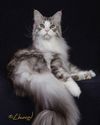
Feline Photographers Part 1
\"Cats never strike a pose that isn't photogenic.\" - Lillian Jackson Braun
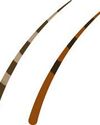
The Cat Fancy Alphabet
\"The Cat Fancy Alphabet\" is a new feature in Cat Talk. It highlights various terms and aspects of the cat fancy, educating fanciers new and old about our hobby.

UP CLOSE AND Purr-sonal
If there is one person, or even just a name, that anyone in CFA (Cat Fancier Association) knows, it would have to be Allene Tartaglia. It might be from her involvement with most aspects of the operations of CFA in her position of executive director. Or perhaps from her deep involvement with both the CFA Annual meeting and/or the International Show. Cat Talk thought it was time to learn more about one of the most key people in CFA.
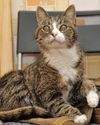
Vision and Hearing Dysfunctions in Senior Cats
Just as people are challenged by having deficiencies with vision and hearing over time, so are senior cats. In senior cats, pet owners may notice their cats are no longer responding to them in the same way; however, it may be difficult to figure out.
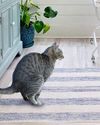
Senior Cats and House Soiling
Why is my cat no longer using its litter box? Cat soiling in the house is one of the most talked about issues for pet owners.
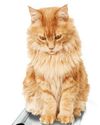
Nutrition for Our Senior Cats
From the time they are born, our kittens receive a tremendous amount of care, with diet being at the core of their growth and development.

Fluffy's Sixteen and STILL Plays Like a Kitten!
Enrichment for Senior Cats

Alternative Arthritis Treatments for Cats
Just like humans, cats can experience arthritis. About 90% of cats over the age of 10 years experience osteoarthritis (OA) in at least one joint.1 It is a complex condition involving inflammation and degeneration of one or more joints and is sometimes referred to as degenerative joint disease (DJD). Cats with OA experience pain and inflammation in various joints that interfere with daily activities.

Checklist For What to Look For in Your Club's Next Show Venue
Show Manager To Ring One, Please